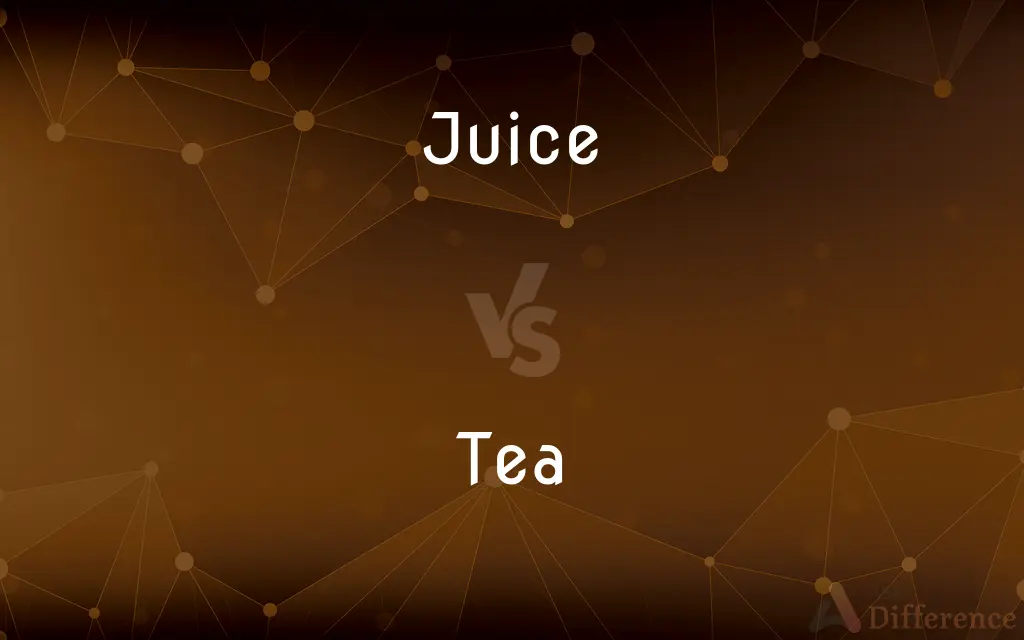Juice vs. Tea — What's the Difference?
By Urooj Arif & Maham Liaqat — Updated on March 24, 2024
Juice is a drink made from the extraction or pressing of the natural liquid contained in fruit and vegetables, while tea is a beverage made by pouring hot or boiling water over cured or fresh leaves of the Camellia sinensis plant or various herbs.

Difference Between Juice and Tea
Table of Contents
ADVERTISEMENT
Key Differences
Juice is derived from the liquid in fruits and vegetables, either through squeezing or pressing, capturing the essence of the produce, including flavors, vitamins, and minerals. Tea, on the other hand, involves steeping the leaves of the Camellia sinensis plant or herbal infusions in hot water, extracting flavors, antioxidants, and caffeine in the case of traditional teas.
The nutritional content of juice varies widely depending on the source fruits or vegetables, often rich in vitamins like vitamin C and minerals, but can also contain high levels of natural sugars. Tea generally contains minimal calories and nutrients, but is valued for its antioxidant properties, particularly in green and black teas, and may contain caffeine unless it's an herbal variety.
Juice consumption is often recommended in moderation due to its high sugar content, even though it's natural sugar, as it lacks the fiber found in whole fruits and vegetables. Tea is widely regarded as a healthier option due to its lower calorie content and potential health benefits related to antioxidants and other bioactive compounds.
The preparation of juice typically involves mechanical processes to extract the liquid, with options ranging from fresh, squeezed-at-home juices to commercially produced and packaged varieties. Tea preparation is a simpler process, involving just the infusion of tea leaves or bags in hot water, making it a convenient and quick option for many.
Culturally, juice varies widely around the world, with different regions favoring juices from local fruits and vegetables, often consumed as a refreshment or part of breakfast. Tea has deep cultural roots in many countries, with traditions surrounding its preparation and consumption, such as the British afternoon tea or the Japanese tea ceremony.
ADVERTISEMENT
Comparison Chart
Source
Extracted from fruits and vegetables.
Made from the Camellia sinensis plant or herbal infusions.
Nutritional Content
Rich in vitamins and minerals, high in natural sugars.
Low in calories, rich in antioxidants, may contain caffeine.
Health Considerations
High sugar content; lacks fiber.
Lower calorie; associated with health benefits like improved heart health.
Preparation
Mechanical extraction; can be homemade or commercially produced.
Steeping in hot water; involves minimal processing.
Cultural Significance
Varies regionally, often consumed as a refreshment.
Deep cultural traditions, with specific ceremonies and rituals in some cultures.
Compare with Definitions
Juice
A liquid extracted from fruits and vegetables, retaining most of the natural nutrients and flavors.
Orange juice is a popular breakfast beverage, valued for its high vitamin C content.
Tea
A beverage made by steeping cured or fresh leaves of the Camellia sinensis plant or herbal infusions in hot water.
Green tea is consumed for its antioxidant properties and is part of many daily routines.
Juice
Can be freshly prepared or commercially processed, with variations in nutritional quality.
Freshly squeezed apple juice contains natural sugars and a variety of vitamins.
Tea
Preparation and consumption of tea can be a simple daily ritual or part of elaborate cultural ceremonies.
The Japanese tea ceremony is a cultural activity involving the ceremonial preparation and presentation of matcha.
Juice
The variety of juice depends on available produce, with tropical regions offering a wide range of fruit juices.
Mango juice is a favorite in tropical regions, enjoyed for its sweet, rich flavor.
Tea
Contains a variety of compounds beneficial to health, including antioxidants, and may offer calming or stimulating effects depending on the type.
Black tea, rich in flavonoids, is known for its potential heart health benefits.
Juice
Considered a staple in many diets, often served with breakfast or as a snack.
A glass of cranberry juice is often consumed for its flavor and potential health benefits.
Tea
Regarded as one of the most widely consumed beverages globally, second only to water.
In the United Kingdom, tea is a central part of daily life and social occasions, often accompanied by biscuits or cakes.
Juice
Often consumed for its refreshing qualities and nutritional benefits, though caution is advised due to sugar content.
Carrot juice provides beta-carotene and other nutrients, but it's best consumed in moderation.
Tea
Offers a wide range of flavors, from the robustness of black tea to the delicacy of white tea, and the earthiness of herbal teas.
Chamomile tea is often consumed for its soothing effects and gentle flavor.
Juice
Juice is a drink made from the extraction or pressing of the natural liquid contained in fruit and vegetables. It can also refer to liquids that are flavored with concentrate or other biological food sources, such as meat or seafood, such as clam juice.
Tea
Tea is an aromatic beverage prepared by pouring hot or boiling water over cured or fresh leaves of Camellia sinensis, an evergreen shrub native to China and East Asia. After water, it is the most widely consumed drink in the world.
Juice
A fluid naturally contained in plant or animal tissue
Fruit juice.
Meat braised in its own juices.
Tea
A hot drink made by infusing the dried crushed leaves of the tea plant in boiling water
Katherine sipped her tea
Juice
A bodily secretion
Digestive juices.
Tea
The evergreen shrub or small tree which produces tea leaves, native to southern and eastern Asia and grown as a major cash crop.
Juice
The liquid contained in something that is chiefly solid.
Tea
A light afternoon meal consisting typically of tea to drink, sandwiches, and cakes
Picnic teas
They were about to take afternoon tea
Juice
A beverage made from fruit juice or fruit-flavored syrup that is often combined with sweeteners, water, or other ingredients.
Tea
Drink tea or take afternoon tea
I teaed with Professor Herron
Juice
A substance or quality that imparts identity and vitality; essence.
Tea
An evergreen shrub or small tree (Camellia sinensis) native to Asia, having fragrant, nodding, cup-shaped white flowers and glossy leaves.
Juice
(Slang) Vigorous life; vitality.
Tea
The young, dried leaves of this plant, prepared by various processes and used to make a beverage, usually served hot.
Juice
(Slang) Political power or influence; clout.
Tea
An aromatic, slightly bitter beverage made by steeping tea leaves in boiling water.
Juice
Electric current.
Tea
Any of various plants, such as New Jersey tea, having leaves that are or were formerly used to make a tealike beverage.
Juice
Fuel for an engine.
Tea
Any of various beverages made by steeping the leaves, flowers, fruits, or other parts of certain plants
Herbal tea.
Peppermint tea.
Juice
(Slang) Funds; money.
Tea
Any of various beverages made by extracting an infusion from meat, especially beef.
Juice
Alcoholic drink, especially liquor.
Tea
A tea rose.
Juice
A substance, such as a steroid, taken to enhance performance in an athletic event.
Tea
An afternoon refreshment consisting usually of sandwiches and cakes served with tea.
Juice
A usually flavored liquid prepared for use in an e-cigarette or similar device.
Tea
High tea.
Juice
(Slang) Racy or scandalous gossip.
Tea
An afternoon reception or social gathering at which tea is served.
Juice
To extract the juice from.
Tea
(Slang) Marijuana.
Juice
To drink alcoholic beverages excessively.
Tea
(uncountable) The tea plant (Camellia sinensis); (countable) a variety of this plant.
Darjeeling tea is grown in India.
Juice
To take a steroid or other substance to enhance athletic performance.
Tea
(uncountable) The dried leaves or buds of the tea plant; (countable) a variety of such leaves.
Go to the supermarket and buy some Darjeeling tea.
Not for all the tea in China.
Juice
(uncountable) A liquid from a plant, especially fruit.
Squeeze the orange and some juice will come out.
Tea
(uncountable) The drink made by infusing these dried leaves or buds in hot water.
Would you like some tea?
Juice
(countable) A beverage made of juice.
I’d like two orange juices please.
Tea
(uncountable) Any similar drink made by infusing parts of various other plants.
Camomile tea; mint tea
Juice
(uncountable) Any liquid resembling juice.
Moo juice
Tea
Meat stock served as a hot drink.
Beef tea
Juice
(Scotland) A soft drink.
Tea
A cup or glass of any of these drinks, often with milk, sugar, lemon, and/or tapioca pearls.
Juice
Liquor.
Tea
A light midafternoon meal, typically but not necessarily including tea.
Juice
(informal) The liquid that is used to submerge a substance kept in a container
[[sauerkraut juice (the brine in a jar of sauerkraut)
Tea
Syn of supper, the main evening meal, whether or not it includes tea.
The family were sitting round the table, eating their tea.
Juice
(slang) The leftover liquid of some wet or damp substance.
Dumpster juice (liquid which oozes out of garbage dumpsters)
Tea
(cricket) The break in play between the second and third sessions.
Australia were 490 for 7 at tea on the second day.
Juice
Vitality, strength.
Tea
Syn of marijuana.
Juice
Political power.
Tea
Information, especially gossip.
Spill the tea on that drama, hon.
Juice
Petrol; gasoline.
Tea
A moment, a historical unit of time from China, about the amount of time needed to quickly drink a traditional cup of tea. It is now found in Chinese-language historical fiction.
Juice
Electricity.
Tea
To drink tea.
Juice
Steroids.
Tea
To take afternoon tea (the light meal).
Juice
Semen.
Tea
To give tea.
Juice
The amount charged by a bookmaker for betting services.
Tea
The prepared leaves of a shrub, or small tree (Thea Chinensis or Camellia Chinensis). The shrub is a native of China, but has been introduced to some extent into some other countries.
Juice
Musical agreement between instrumentalists.
Tea
A decoction or infusion of tea leaves in boiling water; as, tea is a common beverage.
Juice
(transitive) To extract the juice from something.
Tea
Any infusion or decoction, especially when made of the dried leaves of plants; as, sage tea; chamomile tea; catnip tea.
Juice
(transitive) To energize or stimulate something.
Tea
The evening meal, at which tea is usually served; supper.
Juice
To take a performance-enhancing drug.
Tea
To take or drink tea.
Juice
Alternative spelling of Jew's (used in certain set phrases like juice harp)
Tea
A beverage made by steeping tea leaves in water;
Iced tea is a cooling drink
Juice
The characteristic fluid of any vegetable or animal substance; the sap or part which can be expressed from fruit, etc.; the fluid part which separates from meat in cooking.
An animal whose juices are unsound.
The juice of July flowers.
The juice of Egypt's grape.
Letters which Edward Digby wrote in lemon juice.
Cold water draws the juice of meat.
Tea
A light midafternoon meal of tea and sandwiches or cakes;
An Englishman would interrupt a war to have his afternoon tea
Juice
To moisten; to wet.
Tea
Dried leaves of the tea shrub; used to make tea;
The store shelves held many different kinds of tea
They threw the tea into Boston harbor
Juice
The liquid part that can be extracted from plant or animal tissue
Tea
A reception or party at which tea is served;
We met at the Dean's tea for newcomers
Juice
Energetic vitality;
Her creative juices were flowing
Tea
A tropical evergreen shrub or small tree extensively cultivated in e.g. China and Japan and India; source of tea leaves;
Tea has fragrant white flowers
Juice
Electric current;
When the wiring was finished they turned on the juice
Juice
Any of several liquids of the body;
Digestive juices
Common Curiosities
Can drinking juice contribute to weight gain?
Yes, due to its high natural sugar content and lack of fiber, excessive juice consumption can contribute to weight gain.
Are herbal teas true teas?
Herbal teas, also known as tisanes, are not considered true teas as they do not come from the Camellia sinensis plant but are infusions of herbs, spices, or other plants.
What are the main types of tea?
The main types of tea are white, green, oolong, and black, derived from the Camellia sinensis plant, differing in processing and oxidation levels.
What is juice made from?
Juice is made from the natural liquid in fruits and vegetables, extracted through pressing or squeezing.
How can tea consumption affect sleep?
Tea containing caffeine, such as black or green tea, can disrupt sleep patterns if consumed late in the day, while herbal teas like chamomile may promote relaxation and better sleep.
What is the best time to consume juice?
Consuming juice in moderation, ideally during the first half of the day, can minimize potential impacts on blood sugar levels.
What are the health benefits of tea?
Tea is associated with various health benefits, including improved heart health, antioxidant effects, and, in the case of herbal teas, various medicinal properties depending on the ingredients.
Is it better to drink juice or eat whole fruits?
Eating whole fruits is generally considered better due to the fiber content, which aids digestion and helps regulate sugar absorption.
How does the antioxidant content of tea compare to other beverages?
Tea, particularly green tea, is high in antioxidants compared to most other beverages, offering unique health-promoting properties.
Can tea be consumed on an empty stomach?
While some people tolerate tea on an empty stomach, others may experience discomfort or acidity, so personal tolerance should guide consumption habits.
Share Your Discovery

Previous Comparison
Husky vs. Chubby
Next Comparison
Cheat vs. LieAuthor Spotlight
Written by
Urooj ArifUrooj is a skilled content writer at Ask Difference, known for her exceptional ability to simplify complex topics into engaging and informative content. With a passion for research and a flair for clear, concise writing, she consistently delivers articles that resonate with our diverse audience.
Co-written by
Maham Liaqat













































